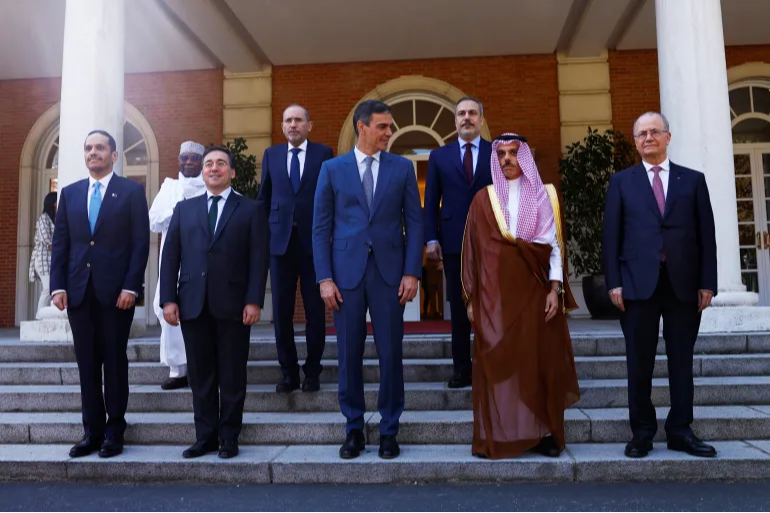
Spain's Prime Minister Pedro Sanchez poses with Spanish Foreign Minister Jose Manuel Albares, Palestinian Prime Minister Mohammad Mustafa, Qatar's Foreign Minister Mohammed bin Abdulrahman bin Jassim Al Thani, Saudi Arabia's Foreign Minister Prince Faisal bin Farhan bin Abdullah, Jordan's Foreign Minister Ayman Safadi, Turkey's Foreign Minister Hakan Fidan and Secretary General of the Organisation of Islamic Cooperation Hissein Brahim Taha. Moncloa Palace in Madrid, Spain, May 29, 2024. REUTERS/Susana Vera
Madrid, June 6 (RHC)-- After Spain recognized Palestinian statehood, Pedro Sanchez met with his Palestinian counterpart, Prime Minister Mohammad Mustafa, and leading officials from several Middle Eastern countries in Madrid.
Saudi Arabian Foreign Minister Prince Faisal bin Farhan Al Saud, Qatari Prime Minister Sheikh Mohammed bin Abdulrahman Al Thani, and the foreign ministers of Turkey and Jordan were among the group that later posed for a photo on the steps of the Moncloa Palace in the Spanish capital.
“On behalf of President [Mahmoud] Abbas and the government of Palestine, the people of Palestine, we warmly welcome Spain’s recognition of the state of Palestine,” Mustafa said of Spain’s historic move. “This recognition strengthens our resolve to continue our struggle for a just and lasting peace.”
Ireland, Norway and Slovenia have also joined Spain in the push that has been roundly condemned by Israel.
Israeli Foreign Minister Israel Katz sent a furious direct message addressed to Sanchez on X, writing: “Hamas thanks you for your service,” along with a 17-second video that flipped between images of flamenco dancers and apparent scenes of the Palestinian group’s incursion into southern Israel on October 7th.
The Zionist foreign minister has accused Spain of complicity “in inciting genocide against Jews and war crimes” and called Spain’s deputy prime minister, Yolanda Diaz, anti-Semitic after she closed a speech with the pro-Palestinian slogan “From the river to the sea.”
Widely used at pro-Palestinian demonstrations, the slogan refers to the British mandate borders of Palestine, which stretched from the Jordan River to the Mediterranean before Israel was created in 1948.
For months, diplomatic relations between Israel and Spain have descended to new lows. Each side has summoned ambassadors as the war in Gaza rages. After Spain’s landmark move, Israel ordered the Spanish consulate in Jerusalem to halt services to Palestinians in the occupied West Bank as a “punitive” measure.
And tensions are certain to rise further, as Spain on Thursday announced it would join South Africa’s genocide case before the International Court of Justice against Israel’s actions in Gaza.
Spain is the first European nation to back the case at The Hague.
Long a supporter of Palestinian rights, Spain led the push towards recognition hoping to pave a pathway to peace and a two-state solution. Sanchez said the “historic decision … has a single goal and that is to help Israelis and Palestinians achieve peace”.
According to some observers, pressure from Sumar, a far-left party and the junior partner in Spain’s coalition government, had an impact on the final decision by Sanchez, who also reportedly plans to host an international peace conference in Madrid.
But Manuel Muniz, dean of the School of Politics, Economics and Global Affairs at the IE University in Madrid, said Israel may oppose Spain’s involvement in future peace talks.
“In terms of the impact on Spain-Israel relations, it is quite evident that the short-term effects are significant,” he told Al Jazeera.
“What remains unclear, is the impact that all this will have in the longer term. It probably means Israel will push back against Spanish involvement in future peace talks with the Palestinians. But this will depend on the nature of the government in Israel.”
Isaias Barrenada Bajo, a specialist in relations between Spain and Palestine at the University of Complutense in Madrid, said the unilateral recognition of the Palestinian state was the culmination of years of cross-party policy in Spain.
In 2014, the Spanish parliament passed a motion to recognise the Palestinian state but it never came to fruition. “What has made the difference now is the war in Gaza and the pressure of Sumar to recognise the Palestinian state,” he told Al Jazeera.
Barrenada said since the death of the dictator General Francisco Franco in 1975, all Spanish governments of differing political colours have supported Palestine’s right to a state.
Away from the political arena, popular opinion in Spain appears to favour backing a Palestinian state.
A survey for the Real Elcano Institute, a think tank based in Madrid, found 78 percent of Spaniards favored the recognition of Palestine, while 18 percent were against and 4 percent did not know.
Jorge Hernandez, 42, a car company executive from Barcelona, believes Spain had to act. “The United States and Britain are doing nothing but the killing on both sides goes on. Other countries must do something. I don’t know if recognising Palestine will make any difference, but we have to put some pressure so the fighting stops,” he told Al Jazeera.
But for Spain’s small Jewish population, estimated to number about 50,000, some say the atmosphere has worsened since October 7.
On that day, Hamas led an incursion into southern Israel, during which 1,139 people were killed and 250 were taken captive, that sharply escalated the historic Israel-Palestine conflict.
Israel’s onslaught of Gaza since, by far its deadliest war on the besieged enclave, has killed more than 36,000 Palestinians to date, according to health officials.

